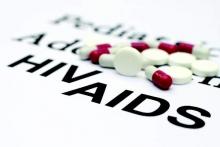A great volume of HIV and AIDS research enters the medical literature every month. It’s difficult to monitor everything, so here’s a quick look at some notable news items and journal articles published over the past few weeks.
Projected growth in the HIV provider workforce by 2019 will not accommodate the increased number of HIV-infected persons requiring care, according to a study in Clinical Infectious Diseases. The authors said facilities funded by the Ryan White HIV/AIDS Program may face attrition of highly qualified providers.
South African HIV-infected children receiving antiretroviral therapy have lower bone mass, compared with HIV-uninfected controls, according to a study by the CHANGES Bone Study group. The authors said accrued bone mass is positively associated with switching to efavirenz-based ART, compared with remaining on ritonavir-boosted lopinavir.
Sexually transmitted infection acquisition in HIV-infected adolescents and young adults is associated with older age, female sex, nonperinatal HIV acquisition, and poorly controlled HIV infection, according to a study in the Journal of the Pediatric Infectious Diseases Society.
A study in the journal AIDS found that viral escape in the Nef peptide is elevated preferentially in STEP vaccine–treated individuals, suggesting that vaccination primarily modulated initial cytotoxic T-lymphocyte responses.
A clinical HIV vaccine trial found that vaccination was associated with increases in HIV cell-associated RNA and HIV-specific responses during antiretroviral therapy.
The European Medicines Agency (EMA) has recommended granting a marketing authorization in the European Union (EU) for Truvada (emtricitabine/tenofovir disoproxil) for preexposure prophylaxis (PrEP) in combination with safer sex practices to reduce the risk of sexually acquired HIV-1 infection in adults at high risk.
Five-year outcomes from the IMPAACT-P1060 trial of HIV-infected antiretroviral-eligible children supported the WHO recommendation of lopinavir/ritonavir (LPV/r) in first-line ART regimens for HIV-infected children.
A systematic review of medical literature, published in Tropical Medicine & International Health, found that rigorously evaluated interventions for adult posttraumatic stress disorder in people living with HIV are rare.
HIV-infected adolescents and young adults are vulnerable to virologic failure, especially during the transitional period, a recent study found. The authors said identification of HIV-infected adolescents at high risk for virologic failure might help to improve treatment success.
Treatment for HIV infection can be started on the day of diagnosis without impacting the safety or acceptability of antiretroviral therapy, according to a study in JAIDS, and may shorten the time to virologic suppression.
New research indicates that Measurement-Based Care (MBC) interventions on depression, if implemented among HIV-infected depressed adults in routine care, may be less effective than in randomized controlled trials but can still be expected to reduce depression.
A study published in Mycoses revealed that H. capsulatum is an important agent of disseminated disease in AIDS patients in Brazil. The authors said this reinforces the importance of making available modern diagnostic tests as well as safer antifungal agents for the treatment of histoplasmosis.
An epidemiologic analysis indicates that substantial decreases in HIV incidence are possible in South Africa from sufficient uptake of both primary prevention and antiretroviral therapy, but with continuation of the status quo, HIV elimination in the country is unlikely within a 50-year time scale.
A meta-analysis showed a consistent increased risk of mortality for HIV-exposed uninfected vs. HIV-unexposed uninfected infants and children, although the authors said longitudinal research is needed to elucidate underlying mechanisms, which may help explain the differences in mortality.
A number of factors can identify HIV-infected patients at low risk of rebound with protease inhibitor (PI) monotherapy, said investigators in the PIVOT trial, and this may help to better target those who may benefit from this management strategy.
Concomitant administration of cytotoxic chemotherapy and combination antiretroviral therapy does not induce expression of membrane drug transporter protein (MTP) in HIV-infected patients, according to a study in HIV Clinical Trials. The authors said no significant changes in viral resistance were observed before and after chemotherapy, suggesting mutagenic cytotoxic chemotherapy seems not to induce mutations in HIV pro-viral DNA.
A study of HIV-infected patients with cryptococcal meningitis in the Ivory Coast revealed a high genetic diversity among Cryptococcus isolates, the occurrence of mixed infections and a high antifungal susceptibility for the majority of Ivorian cryptococcal isolates.
A Zambian study found no associations between hormonal contraception use among HIV-positive women and the risk of female-to-male HIV transmission.
Despite late presentation to HIV care, foreign-born persons can subsequently engage in their own HIV care as well as U.S.-born persons, according to a study in AIDS Care. The authors recommend interventions that promote HIV screening in foreign-born persons as a promising way to improve outcomes in these populations.


